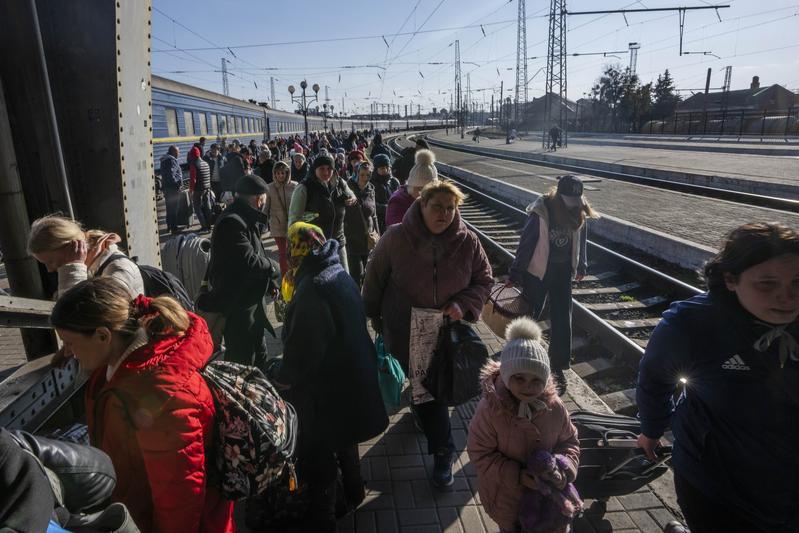 Displaced people arrive from Dnipro to the Lviv main station, western Ukraine, March 24, 2022. (NARIMAN EL-MOFTY / AP)
Displaced people arrive from Dnipro to the Lviv main station, western Ukraine, March 24, 2022. (NARIMAN EL-MOFTY / AP)
Russia has announced it will require "unfriendly countries" to start paying for gas supplies in rubles, increasing pressure on the European Union ahead of a slew of emergency summits on Thursday involving US President Joe Biden and Western leaders.
"I have decided to implement a set of measures to transfer payments for our gas supplies to unfriendly countries into Russian rubles," Russian President Vladimir Putin said, ordering the changes to be implemented within a week.
"I would like to stress separately that Russia will definitely continue supplying natural gas in accordance with volumes and prices, pricing principles set in earlier concluded contracts," Putin announced at a Cabinet meeting on Wednesday.
The measures are part of Russia's response to unprecedented sanctions leveled by Western countries on Moscow in response to its "special military operation" in Ukraine. Russia deems all countries that have hit it with sanctions as "unfriendly"
The measures are part of Russia's response to unprecedented sanctions leveled by Western countries on Moscow in response to its "special military operation" in Ukraine. Russia deems all countries that have hit it with sanctions as "unfriendly".
Europe imports around 40 percent of its natural gas from Russia, with contracts typically priced in euros. Russia's gas exports to "unfriendly" countries came in at around $50 billion in 2021, according to an estimate by Loko Invest.
German Economy Minister Robert Habeck, whose country imported 55 percent of its natural gas from Russia before the conflict, said Putin's demand was a breach of contract and that Berlin will discuss with European partners "how we would react to that".
Austria's OMV energy company said on Wednesday that it would still keep paying for Russian gas in euros despite the announcement. "We don't have any other basis for the contract. I wouldn't be able to do otherwise," OMV CEO Alfred Stern told Austrian television.
ALSO READ: China supports UN's role in Ukraine's humanitarian issue
The announcement by Putin came as Biden and Western leaders were finalizing a package of new measures to pressure Russia, help Ukraine and demonstrate Western unity at a string of emergency summits on Thursday.
Biden will meet with NATO, the Group of Seven and the European Council during his 2-day visit in Brussels.
NATO Secretary-General Jens Stoltenberg stressed on Wednesday that the bloc won't send troops to Ukraine after Poland proposed the alliance send peacekeeping troops. "NATO is not part of the conflict. It provides support to Ukraine but isn't part of the conflict," he said.
Biden and European leaders are also expected to announce a major initiative to direct shipments of liquefied natural gas to Europe this week, part of a broader effort to help reduce the continent's dependence on Russian energy, according to three US officials familiar with the plan.
The Russian stock market resumed limited trading on Thursday under heavy restrictions, almost one month after prices plunged and the market was shut down after the start of Moscow's "special operation" in Ukraine. Trading of a limited number of stocks including energy giants Gazprom and Rosneft took place under curbs that are meant to prevent a repeat of the massive sell-off that took place on Feb 24 in anticipation of Western economic sanctions.
READ MORE: Russia-Ukraine conflict 'adds uncertainty to Asian economy'
The reopening will be a crucial test for Russia's economy amid what Central Bank chief Elvira Nabiullina has called a "period of large-scale structural transformation".
Meanwhile, the Ukrainian Navy said on Wednesday that it had destroyed a Russian naval transport vessel docked in the Azov Sea near the besieged port city of Mariupol.
There was no immediate response from Russia's Defense Ministry to the claim, although videos on social media appeared to show a very large fire with secondary explosions in the port.
Agencies contributed to this story.


